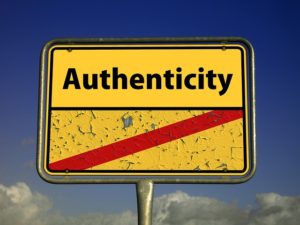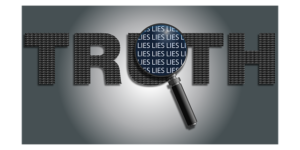
When I was a young child, during a season of heavy rain, the large creek behind our house, overflowed its banks. I remember my father placing a stake in the backyard to mark the edge of the water. Then, several times a day, he marked the water level on the stake. Eventually, the water level was above the stake, but didn’t reach our house.
The local paper sent a reporter and photographer to document the flooding. The reporter placed my tricycle in the overflowing drainage ditch in front of a house below ours and instructed the photographer to take a picture with me standing beside it. “Her yard isn’t flooded enough. We need to make this look like it’s her yard,” said the reporter.
Even at tricycle age, I knew pretending, i.e., lying, about the flooded drainage ditch being our yard was wrong.
Following are some thoughts on guarding against deception:

Be Wise
Years ago, my husband and I got sucked into one of those presentations that involved a free stay at a resort, but was really nothing more than a high-pressure sales pitch to purchase a timeshare. When I saw the presenters lock the doors to the conference room, my radar went into turbo drive and I knew we’d made a mistake by attending.
A few minutes into the presentation, we played a “game” that required us to display our credit cards on the table in front of us while the staff roamed the room writing names and numbers. That’s when red flags ran all the way up the pole for me.
We got up and headed for the door. The man guarding the door refused to let us leave. I looked him in the eye and said, “Open the door now or I’ll start screaming.” Moments later, we were on the street. We learned a very important lesson that day. If something sounds too good to be true, it usually is.
While you don’t want to become a person who doubts everyone and everything, be wise in your decisions and your interaction with people. No social etiquette rule exists that says you have to divulge personal information to strangers, acquaintances, or anyone. Guard yourself and your information.

Be Cautious
Almost weekly, I get calls telling me, if I don’t act immediately, which usually means calling a number, my “case” will be turned over to authorities for prosecution. Since I haven’t done anything that warrants prosecution, I know the calls are bogus.
But one of the tricks these unscrupulous callers use is to tack on a phrase that makes you think you should call if something is wrong with their information. Either way, they accomplish the goal of having you make a return call. But it’s not your responsibility to correct their “mistake” or respond to a phone call with nebulous information from an unidentified caller.
Any person—telemarketer, salesperson, colleague, family member, friend—who pressures you for immediate action is cause for caution. Pushing for a fast decision often means all isn’t as it seems.

Be Discerning
Several times in recent years, people in our community have embezzled hundreds of thousands of dollars from their employers. These people appeared competent and capable and their employers trusted them. That trust was betrayed and the employers were on the verge of bankruptcy before the crimes came to light. Some are still trying to recover from the damage done by these unscrupulous employees.
While trust is important, it should never negate checks and balances. People exist who are skilled at deception and hide behind a charming personality or a disguise of competency and helpfulness.
Unfortunately, we live in a time when much of what you hear, and some people you encounter, can’t be trusted. Don’t assume all are honest, or worry about offending someone by checking out the authenticity of their words and actions. Discernment serves as a safeguard against deception.

Be Aware of Self-Deception
In a culture where deception is rampant, it’s easy to slide into untruths of our own. At first they may be small—”enhancing” your resume, implying connections or credentials that don’t exist, or keeping a few secrets from your spouse. However, the more you deceive others, the easier it becomes. Soon deception is a way of life and you are lying not only to others, but to yourself and to God. One of the tricky side-effects of deception is keeping up with whom your told what.
My grandfather had a saying that greatly influenced me, “Tell the truth and you don’t have to remember what you said.” Think about it. Do you really want to keep a running catalog of your lies?
Guard against propagating your own deceptions. Be aware and discerning of others. Make truth your watchword and don’t allow personal deceptions, or those of others, to halt your forward motion.
“And now here’s what I want you to do: Tell the truth, the whole truth, when you speak. Do the right thing by one another, both personally and in your courts. Don’t cook up plans to take unfair advantage of others. Don’t do or say what isn’t so. I hate all that stuff. Keep your lives simple and honest.” Decree of God. Zechariah 8:16-17 MSG
©CandyArrington

Candy Arrington is a writer, blogger, speaker, and freelance editor. She often writes on tough topics with a focus on moving beyond difficult life circumstances. Candy has written hundreds of articles, stories, and devotionals published by numerous outlets including: Inspiration.org, Arisedaily.com, CBN.com, Healthgrades.com, Care.com, Focus on the Family, NextAvenue.org, CountryLiving.com, and Writer’s Digest. Candy’s books include When Your Aging Parent Needs Care (Harvest House) and AFTERSHOCK: Help, Hope, and Healing in the Wake of Suicide (B&H Publishing Group).
To receive Candy’s blog, Forward Motion, via email, go to https://candyarrington.com/blog/ and scroll to the bottom of the page to sign up.


2 Comments
Great message Candy. We need to be covered with the armor of God at all times. Deceptions may try to enter our lives at any moment. I am thankful God is with us.
Thanks, Melissa!